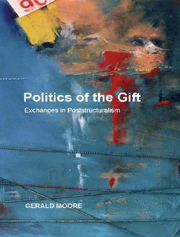Book contents
- Frontmatter
- Contents
- Acknowledgements
- Abbreviations
- Series Editor's Preface
- Introduction: Spectres of Mauss
- 1 Speech, Sacrifice and Shit: Three Orders of Giving in the Thought of Jacques Lacan
- 2 The Eternal Return of the Gift: Deleuze (and Derrida) contra Lacan
- 3 Repeating the Political: Heidegger and Nancy on Technics and the Event
- 4 ‘Pour en finir avec …’: Democracy and Sacrifice
- Conclusion: Variations on a Theme from Nietzsche
- Bibliography
- Index
2 - The Eternal Return of the Gift: Deleuze (and Derrida) contra Lacan
Published online by Cambridge University Press: 12 September 2012
- Frontmatter
- Contents
- Acknowledgements
- Abbreviations
- Series Editor's Preface
- Introduction: Spectres of Mauss
- 1 Speech, Sacrifice and Shit: Three Orders of Giving in the Thought of Jacques Lacan
- 2 The Eternal Return of the Gift: Deleuze (and Derrida) contra Lacan
- 3 Repeating the Political: Heidegger and Nancy on Technics and the Event
- 4 ‘Pour en finir avec …’: Democracy and Sacrifice
- Conclusion: Variations on a Theme from Nietzsche
- Bibliography
- Index
Summary
Eulogising in the immediate aftermath of his contemporary's suicide in 1995, Jacques Derrida describes ‘the flustering, really flustering experience of a closeness or a nearly total affinity’ evoked by the work of Gilles Deleuze (Derrida 2001a: 192/235). Deleuze was, he continues:
the one among all those of my ‘generation’ to whom I have always considered myself closest. I never felt the slightest ‘objection’ arising in me, not even a virtual one, against any of his works, even if I happened to grumble a bit about one or another of the propositions found in Anti-Oedipus […] or perhaps about the idea that philosophy consists in ‘creating’ concepts.
(Derrida 2001a: 192–3/236)For all Derrida's knowingly Deleuzian language in the above citation, the idea of an affinity, or complicity, between the two is belied by the merely fleeting references to each other's work. Despite the intimacy of Parisian intellectual circles, there is also only a single recorded exchange between the two, a brief discussion on the politics of eternal return in Nietzsche, instigated by Pierre Klossowski in 1972 (Klossowski 1973: 111–16). Although there were other encounters, and even a promise of dialogue left unfulfilled by Deleuze's death (Nancy 2005: 8n), it seems safe to say that Derrida was never ‘volé’, stolen, by Deleuze in the way that Félix Guattari was ‘volé’.
- Type
- Chapter
- Information
- Politics of the GiftExchanges in Poststructuralism, pp. 73 - 111Publisher: Edinburgh University PressPrint publication year: 2011



